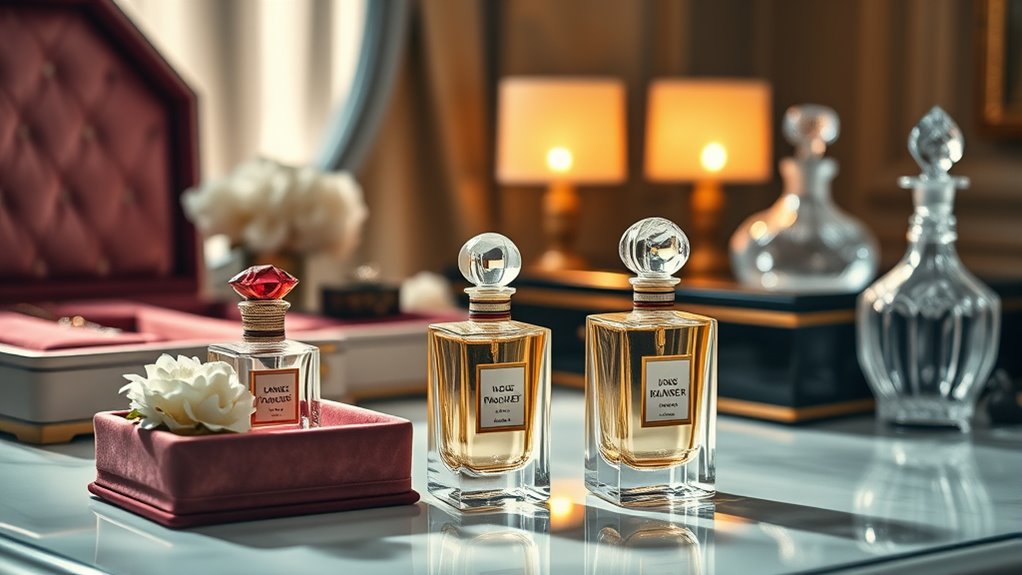To choose the perfect luxury perfume, start by understanding its composition and how different notes develop on your skin. Assess your skin type and natural body odor, which influence scent longevity and how notes interact. Consider your personal preferences, lifestyle, and the occasion, and select fragrances suited to your age and season. Experiment by testing on your pulse points to see how it evolves over time. Keep in mind, proper storage guarantees your scent remains exquisite — explore more for flawless selection tips.
Key Takeaways
- Test perfumes on pulse points and observe how they develop over 15-30 minutes to assess longevity and scent evolution.
- Consider your skin type and pH, as they influence how fragrances interact and enhance certain notes.
- Explore fragrance families that match your personality, age, and lifestyle, such as floral, woody, or citrus scents.
- Personalize your choice by layering scents or combining complementary notes for a unique signature aroma.
- Store perfumes properly in cool, dark places to preserve their quality and ensure a lasting luxurious experience.
Understand the Composition and Notes of Perfume
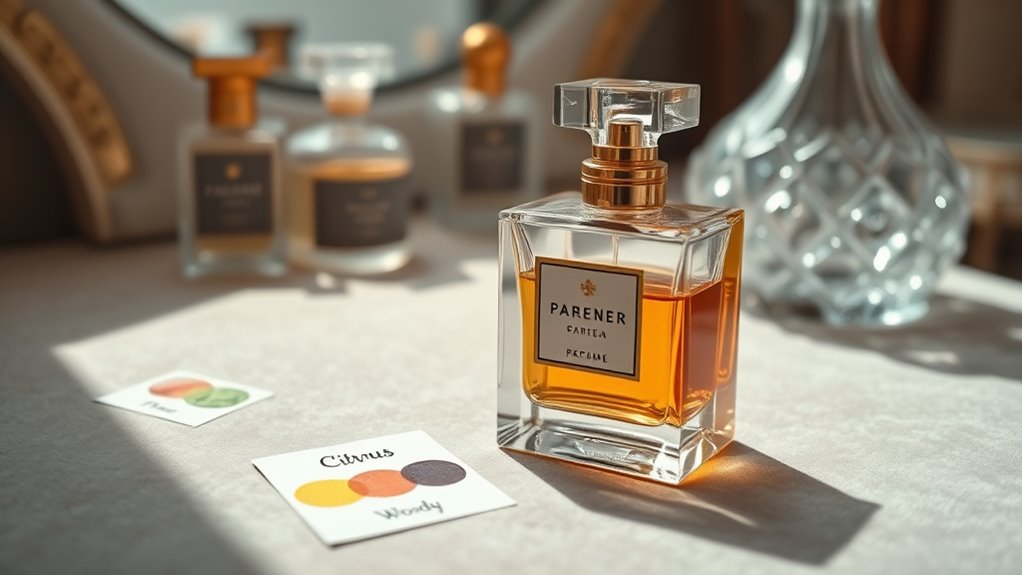
Understanding the composition and notes of perfume is essential when choosing a luxury fragrance. The scent profile of a perfume is built through a blend of natural and synthetic ingredients, categorized into top, heart, and base notes. Top notes are light and volatile, creating the initial impression and lasting about 15-30 minutes. Heart notes develop after the top notes fade, forming the core of the scent and lasting several hours. Base notes are rich and long-lasting, such as musk, amber, or woods, providing depth and longevity. These base notes anchor the fragrance and influence how it evolves on your skin. Recognizing how notes interact helps you select a perfume that aligns with your preferences and enhances your personal style.
Assess Your Skin Type and Body Chemistry
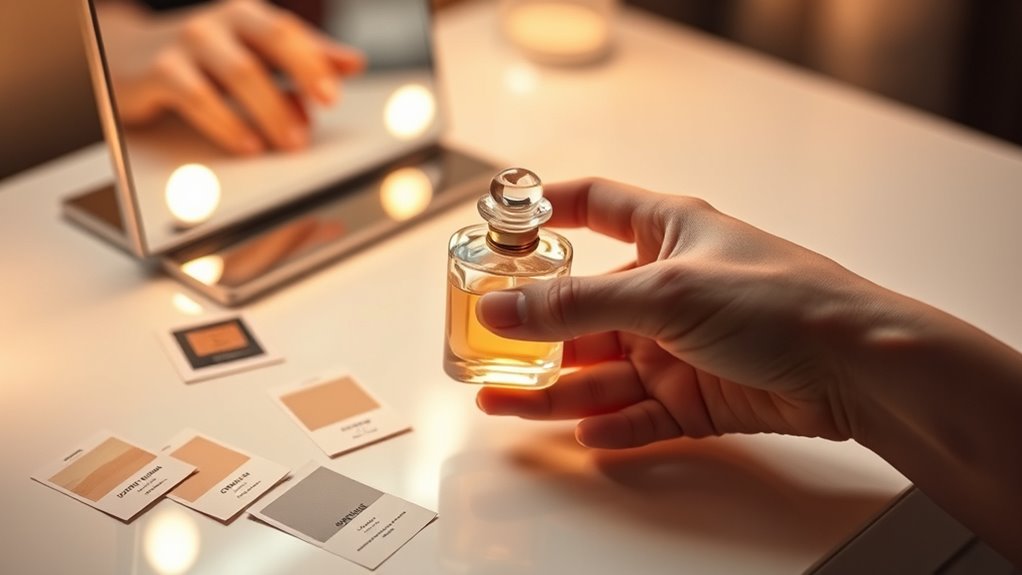
Your skin type and body chemistry play a key role in how a perfume smells and lasts. Factors like skin pH, natural odors, and moisture levels can change how scents develop on you. Testing fragrances on pulse points helps you find the perfect match that complements your unique chemistry. Using vetted perfumes formulated for your skin type can enhance your scent experience and ensure long-lasting wear. Additionally, understanding essential oils safety can help you select products that are both effective and safe for your skin, further improving your overall fragrance experience. Being aware of current credit card insights can also help you make informed purchases of high-quality perfumes that fit your financial situation. Furthermore, understanding home security system effectiveness can inspire confidence in protecting your personal space while you enjoy your new fragrance.
Skin Ph Levels
Since skin pH levels directly impact how perfumes develop and last, evaluating your skin’s pH can help you choose scents that perfectly complement your body chemistry. Your skin’s pH typically ranges from 4.5 to 5.5, influencing fragrance longevity and note development. If your skin is more acidic (lower pH), floral or citrus scents tend to evolve faster and may seem more vibrant. Conversely, higher pH (more alkaline) can make woody or musky notes linger longer and appear more intense. Oily skin generally preserves fragrances longer than dry skin. Testing your perfume directly on your skin over several hours reveals how your body chemistry and pH affect scent evolution and durability, guiding you to select a fragrance that harmonizes with your natural chemistry for lasting, enthralling aroma. Additionally, understanding how your skin type interacts with different perfume compositions can further refine your scent selection process. Recognizing the importance of body chemistry can help you make more informed choices and find the perfect scent that enhances your natural allure.
Furthermore, natural skin oils can influence how fragrances interact with your skin, impacting scent projection and longevity on different skin types.
Skin Type Influence
Evaluating your skin type is essential in choosing a luxury perfume that complements your body chemistry. Your skin chemistry influences fragrance longevity and how the scent develops throughout the day. Oily skin tends to hold fragrances longer, often intensifying warm, oriental, or spicy notes due to better scent projection. Dry skin can cause perfumes to fade faster, so lighter, citrus, or fresh fragrances may last longer on you. Your skin’s pH levels also play a role, with alkaline skin amplifying floral and woody notes, while acidic skin can soften or alter scent development. Melanin levels may subtly affect how floral and fruity notes are perceived. Testing perfumes on your skin for several hours helps you observe how your unique chemistry transforms the scent, ensuring a harmonious match. Additionally, understanding your Cultural Intelligence can help you select fragrances that resonate with your personal or cultural preferences, enhancing your overall scent experience. Recognizing how your skin chemistry interacts with different perfume compositions can lead to a more satisfying and personalized fragrance choice. It is also helpful to consider seasonal variations, as your skin chemistry and scent perception can change with the weather, influencing how fragrances smell and last. Incorporating knowledge of homeostatic balance can further refine your scent selection, since your skin’s moisture and oil levels fluctuate with daily activities and environmental factors.
Natural Body Odor
Understanding your natural body odor is key to selecting a perfume that truly complements your unique chemistry. Your skin chemistry, influenced by genetics and diet, can alter how fragrances interact with your body. Natural body odor blends with your skin’s pH level, affecting fragrance projection and development. Darker or oilier skin tends to hold scents longer and enhances warm, spicy notes, while dry or acidic skin may amplify citrus and floral scents. By testing perfumes on your pulse points, you can observe how your skin chemistry influences fragrance interaction over time. Recognizing your natural body odor helps you choose scents that harmonize with your unique chemistry, ensuring your perfume enhances rather than clashes with your natural scent profile. Additionally, AI-driven diagnostics are increasingly used to analyze individual skin chemistry, offering personalized perfume recommendations and customized scent profiles. Understanding skin pH balance can further refine your perfume selection process, leading to a more harmonious scent experience. Furthermore, being aware of your skin type and chemistry can guide you in selecting fragrances that develop beautifully and last longer throughout the day.
Explore Fragrance Families and Personal Preferences
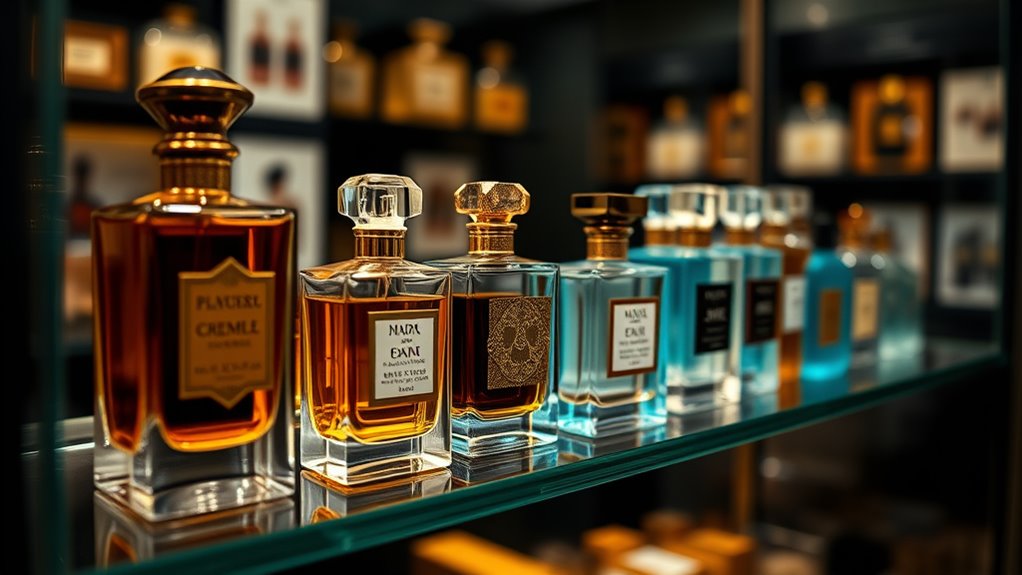
Exploring fragrance families is a vital step in choosing a luxury perfume that truly suits your personality and preferences. Fragrance families categorize perfumes into groups like floral, woody, oriental, citrus, and fresh, each with distinct scent characteristics. Floral scents feature notes such as rose, jasmine, and lily, offering romantic and soft impressions suitable for many occasions. Woody fragrances include sandalwood, cedar, and vetiver, providing warm, earthy aromas that convey confidence and grounding. Citrus scents are bright and energizing, with notes like bergamot, lemon, and orange, perfect for daytime wear and lively settings. Understanding the typical notes and the mood associated with each fragrance family helps you select scents that align with your personal taste and personality, making your perfume choice more meaningful. Additionally, recognizing how fragrance composition influences the overall scent can help you identify perfumes that will develop beautifully over time on your skin. A deeper knowledge of fragrance longevity can also guide you in choosing perfumes that last longer throughout your day. Knowing the aesthetic appeal of different perfume presentation styles can also enhance your overall experience and enjoyment of your fragrance collection.
Test Perfumes on Your Skin to Observe Development
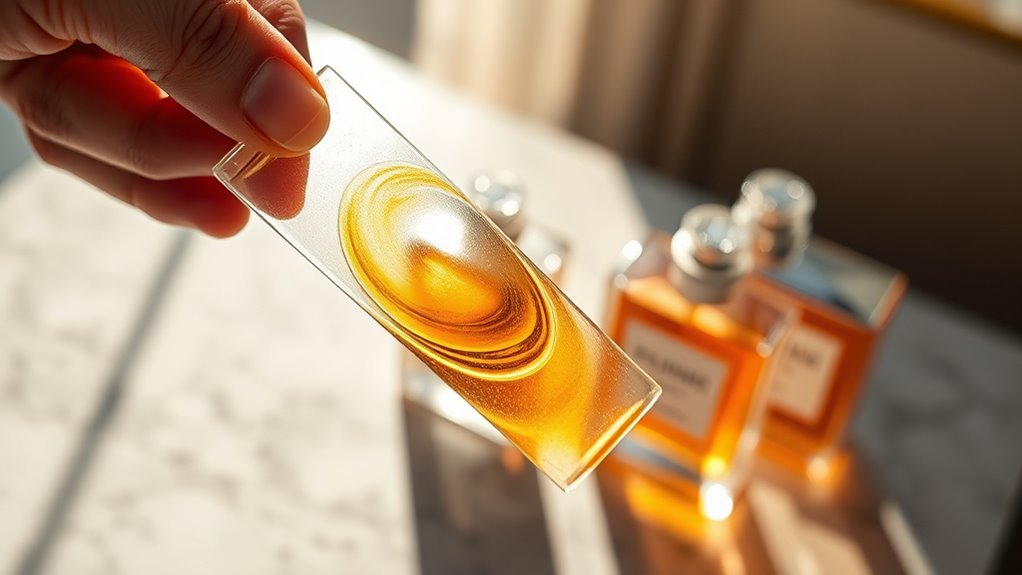
Testing perfumes directly on your skin is essential because it reveals how the scent reacts with your unique body chemistry, which can greatly influence its overall aroma. When you test perfumes, apply them to pulse points like your wrists, neck, or behind your ears—areas that emit heat and help the fragrance develop fully. Give the perfume at least 15-30 minutes to settle so you can observe the full fragrance development, including the top, heart, and base notes. Throughout the day, smell the perfume at different intervals to understand its longevity and how it evolves over time. Remember, always test fragrances on your skin, not on paper strips, because natural oils and scent profiles can substantially alter how a perfume smells on you. Additionally, understanding the cultural impact of fragrance trends can help you choose a scent that resonates with your personal style. Being aware of fragrance composition can also aid in selecting a perfume that aligns with your preferences and desired scent profile. Recognizing how personality traits influence fragrance choices can further guide you in finding a scent that complements your individual character. Exploring psychological preferences may also provide insights into which scents evoke positive emotions and confidence.
Consider Your Age and Lifestyle When Selecting Scents
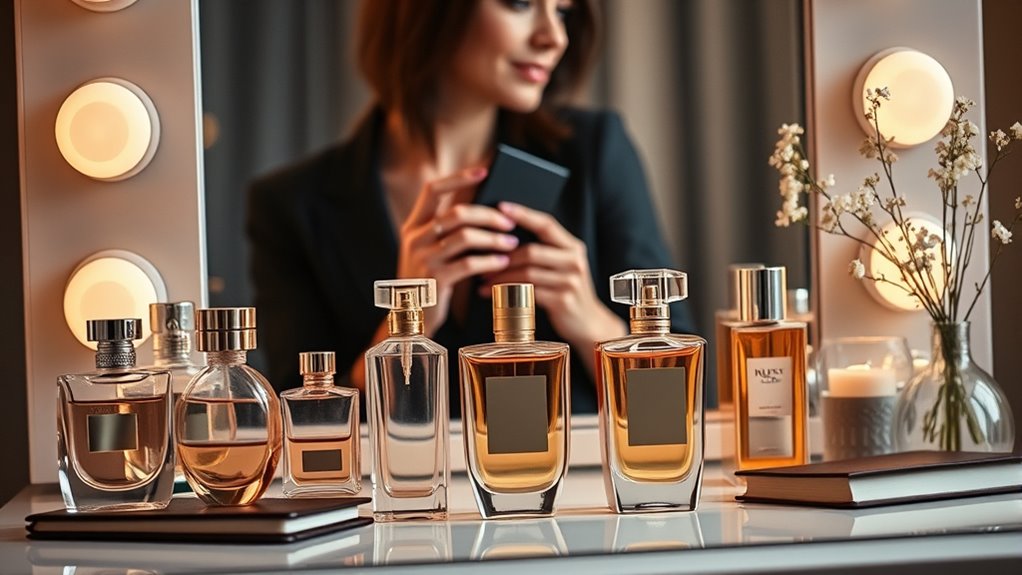
Your age and daily routine play a big role in choosing the right perfume. Younger you might prefer fresh, lively scents, while more mature tastes lean toward richer, complex fragrances. Consider how your lifestyle and social settings align with scent profiles to find a perfect match.
Age-Appropriate Fragrance Choices
Choosing a fragrance that suits your age and lifestyle can enhance your confidence and guarantee you feel comfortable in any setting. When selecting scent harmony, it’s important to ponder age-appropriate fragrance choices. Younger individuals often prefer light, fresh scents like citrus and floral notes that radiate energy and playfulness. In contrast, mature adults tend toward richer, more complex fragrances such as oriental, woody, or gourmand scents that evoke sophistication. Your lifestyle also influences your scent selection; active or casual routines suit clean, subtle perfumes, while formal occasions call for elegant, statement fragrances. As skin chemistry changes with age, opting for base notes like amber, musk, or sandalwood can improve longevity and harmony. Ultimately, selecting scents aligned with your age helps you feel confident and authentic.
Lifestyle-Compatible Scent Profiles
When selecting a perfume, considering how your lifestyle influences scent choices guarantees your fragrance complements your daily activities and environment. Your personal style and routine shape the ideal scent profile, ensuring you feel confident and appropriate. For active days, opt for subtle, long-lasting perfumes with fresh or aquatic accords that won’t overwhelm. If your lifestyle is more professional or sedentary, refined, understated scents like soft florals or light musk work best to maintain elegance without distraction. Younger individuals might prefer energetic citrus or floral notes, while mature adults often choose richer, complex fragrances like oriental or woody notes. Tailoring your scent profile to your lifestyle creates harmony between your fragrance and daily life. Additionally, understanding how decluttering can help you curate your personal collection ensures you only keep fragrances that truly resonate with your lifestyle. Recognizing the importance of personal preferences helps in selecting scents that genuinely suit your individual taste and personality.
Match Perfumes to Seasons and Occasions
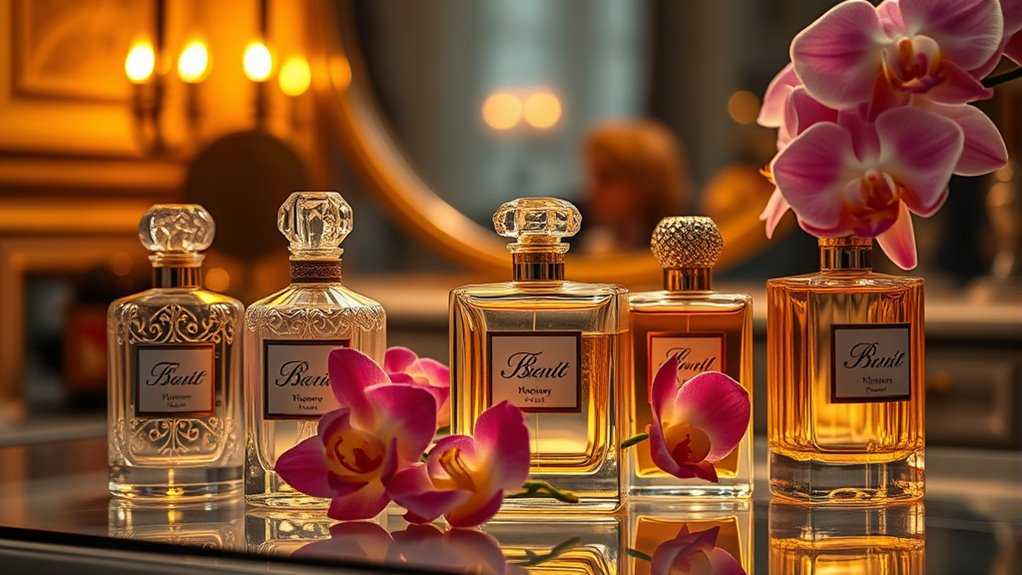
Matching perfumes to seasons and occasions enhances your overall impression and guarantees the fragrance complements the moment. For spring and summer, opt for seasonal fragrances with citrus and green notes that feel fresh and invigorating. During fall and winter, richer scents with amber, vanilla, and spices provide warmth and depth. Occasion-specific scents also matter: floral or woody notes suit formal events, while casual outings are better paired with relaxed, fresh fragrances. Daytime wear benefits from subtle, less intense scents, while evening events call for bold, long-lasting perfumes. Transition seasons are ideal for rotating your signature scents, adjusting fragrance notes to match the climate and occasion. Choosing the right perfume assures you leave a memorable impression no matter the season or setting.
Layer and Personalize Fragrances for a Unique Signature
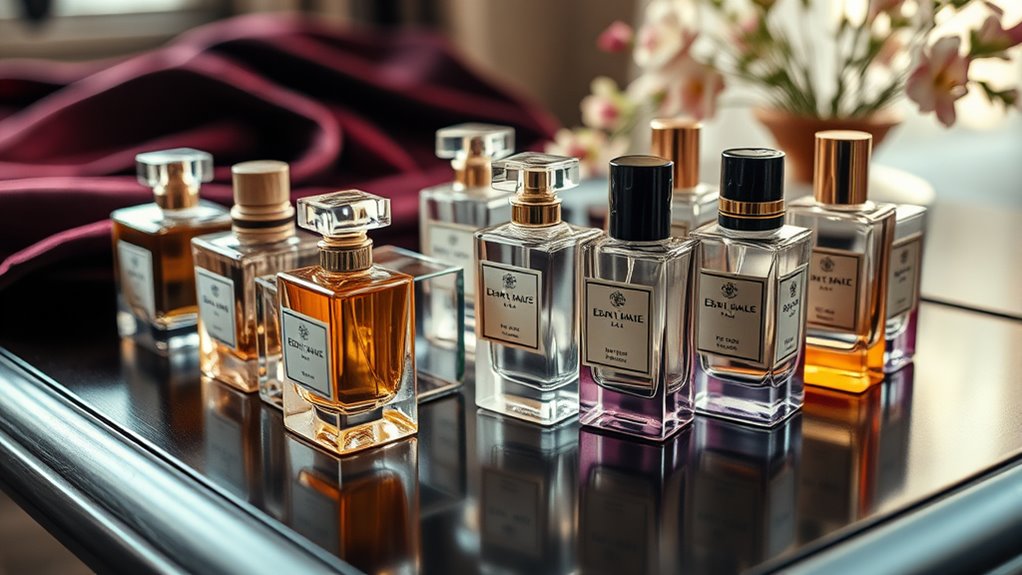
Layering and personalizing your fragrances allows you to craft a truly unique scent that reflects your personality. By combining complementary scents from the same fragrance family, you enhance fragrance harmony and depth. Start with a base perfume featuring heavier notes like vanilla or sandalwood, then add lighter top notes such as citrus or floral for a personalized scent evolution. Experimenting with different perfumes or adding subtle touches, like a splash of your favorite scent, helps create a distinctive olfactory signature. To maximize the effect, apply fragrances at pulse points or on moisturized skin, which improves blending and longevity. Remember to contemplate how each layer interacts over time, ensuring a seamless, balanced, and personal fragrance experience.
Layer and personalize fragrances with layered notes and subtle touches for a unique, balanced scent that evolves over time.
- Mix complementary scents from the same fragrance family
- Use heavier base notes with lighter top notes
- Add subtle touches for uniqueness
- Apply on pulse points or moisturized skin
- Focus on scent interaction over time
Properly Store and Maintain Your Perfume for Longevity

To guarantee your perfume retains its original scent and quality over time, it’s essential to store it properly. Proper storage protects against light, heat, and humidity, which can degrade the fragrance’s components and reduce longevity. Keep bottles in a cool, dark place away from direct sunlight and temperature fluctuations. Always ensure bottles are tightly sealed to prevent oxidation and evaporation, preserving the scent’s intensity. Avoid humid areas like bathrooms, as moisture can alter the chemical structure and lessen a perfume’s lifespan. For ideal preservation, store your perfumes upright in a dedicated drawer or cabinet, reducing dust and accidental spills. Use your perfume within the recommended 3-5 years to maintain its quality and enjoy the fragrance as intended. Proper storage is key to prolonging the life of your luxury perfume.
Frequently Asked Questions
How to Select the Perfect Perfume?
When selecting a perfume, you want to contemplate your skin type and pH, as these affect how a scent develops. Try different fragrance families to find what resonates with your personality, and test perfumes on pulse points to see how they evolve over time. Think about the occasion and season, and trust your instincts—your perfect perfume should feel authentic and make you feel confident and happy.
What Is the 30/50/20 Rule for Perfume?
Imagine your perfume as a symphony, with the 30/50/20 rule as its conductor. You start with the bright, fleeting top notes at 30%, like the opening act that captures attention. Then, the heart notes take center stage at 50%, revealing your true essence. Finally, the lingering base notes at 20% add depth and warmth, ensuring your fragrance leaves a lasting, unforgettable impression throughout the day.
How Do You Figure Out What Perfume Is Best for You?
When figuring out what perfume is best for you, start by understanding your skin type and pH, since they affect scent longevity. Explore different fragrance families and notes that make you feel good. Test perfumes on pulse points and see how they develop over time. Think about your lifestyle and the occasion. Trust your instincts, sample a variety of scents, and choose the one that feels most authentic to your style.
How Do I Know What Perfume Suits My Body?
Imagine your scent as a dance partner; it must match your rhythm to shine. To find what suits your body, test perfumes on your skin, especially pulse points like wrists or behind the ears. Observe how the scent develops over hours and in different spots. Remember, factors like your skin’s pH and oiliness affect the fragrance’s personality, so take your time to find the perfect harmony.
Conclusion
Choosing the right luxury perfume isn’t just about scent; it’s about expressing your unique style. Did you know that 80% of people say their fragrance choice impacts how others perceive them? By understanding notes, testing on your skin, and considering your lifestyle, you can find a scent that truly resonates. Remember, a well-chosen perfume becomes a signature, elevating your presence and leaving a lasting impression.
